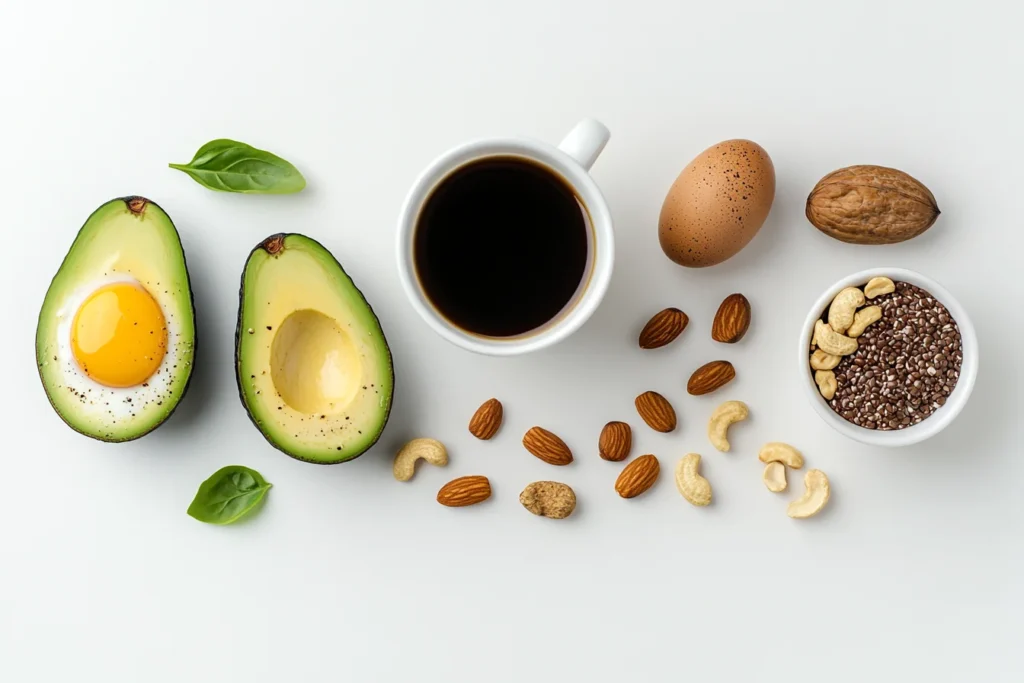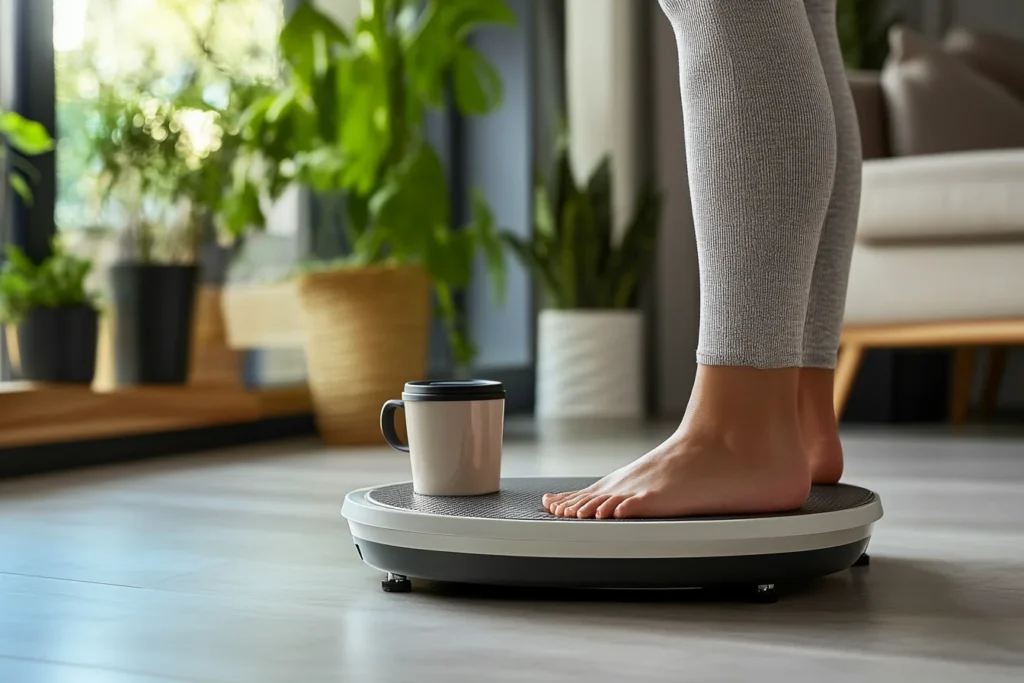Table of Contents
The world of weight loss is filled with countless diets and trends. One that has gained significant attention is the ketogenic lifestyle. Central to this lifestyle is a unique beverage known as keto coffee.
But what is keto coffee?

Simply put, it’s a blend of coffee and fats, often butter and MCT oil. This high-fat, low-carb concoction aligns with the principles of the ketogenic diet. It’s also known as “bulletproof coffee,” a term coined by entrepreneur Dave Asprey.
The question on many people’s minds is: does keto coffee really work to lose weight?
This article aims to answer that question. We’ll delve into the science behind keto coffee and its potential role in weight loss.
We will look at how it works with a keto diet coffee. We will also discuss the good and bad sides of adding it to your meals.
Keto coffee is often consumed in the morning, sometimes as a breakfast replacement. Some proponents claim it can boost energy levels and mental clarity. The high-fat content can act as an appetite suppressant, potentially aiding in weight loss.
However, it’s important to note that keto coffee is not a magic solution. It should be consumed as part of a balanced keto diet to avoid excessive calorie intake. Adding too much fat to your coffee can lead to weight gain if not accounted for in your daily calorie budget.
Introduction
The concept of keto coffee might seem unusual at first. Adding butter or oil to your morning brew is a departure from the typical sugar-laden lattes. Yet, the mix of fats and coffee has sparked interest among those following the ketogenic diet.
This interest isn’t without reason. Enthusiasts claim keto coffee offers more than just a caffeine kick. They suggest that it provides sustained energy, mental clarity, and a sense of fullness. For those on a weight loss journey, these benefits can be particularly appealing.
However, it’s essential to separate fact from fiction. Many variables affect weight loss, and no single beverage will lead to dramatic changes. Understanding keto coffee requires a look into its ingredients and how it fits into the larger picture of the ketogenic lifestyle.
What Is Keto Coffee?
Keto coffee is unique from your standard cup of joe. It blends coffee with fats like butter and MCT oil to align with ketogenic principles. This mixture transforms an ordinary beverage into a rich, creamy drink.
The idea is to support your body’s transition into ketosis, where fat becomes the primary energy source. Keto coffee typically replaces breakfast, sparking fat burning coffee from the start of your day.
Essentially, keto coffee serves two main purposes: energy and satiety. The fats, particularly MCT oil, are quickly processed into ketones. These ketones provide a rapid energy source for your body and brain.

Ingredients for Classic Keto Coffee
- Freshly brewed coffee
- MCT oil (start small and adjust)
- Grass-fed butter or ghee
- Optional flavors: cinnamon, vanilla, or low-carb sweetener
Properly blending these ingredients is crucial. It ensures a smooth, well-emulsified texture, avoiding an oily layer on top. This process creates a luscious drink that can seamlessly fit into one’s morning routine.
The Rise in Popularity of Weight Loss Coffee
In recent years, bulletproof coffee weight loss has become a buzzword among dieters. Much of its appeal is tied to the ongoing popularity of the ketogenic diet. As people seek effective weight loss strategies, they gravitate towards trends that promise results.
Social media and celebrity endorsements have bolstered its growth, showcasing stunning transformations attributed to keto coffee. However, it’s important to approach such claims with a critical eye. The striking before-and-after photos often omit the nuances of personal lifestyle changes.
The convenience factor can’t be ignored, either. Many find that keto coffee simplifies their morning routine, especially when skipping breakfast aligns with intermittent fasting. This combination of convenience and coffee diet trendiness has propelled keto coffee into the spotlight. Yet, recognizing its role as one part of a holistic dietary approach is crucial to ensure balanced, sustainable habits.
Understanding the Keto Diet and Its Connection to Coffee
The ketogenic diet has gained significant attention for its unique approach to health and weight management. At its core, the keto diet emphasizes high fat, moderate protein, and very low carbohydrate intake. The primary aim is to shift the body’s metabolism toward using fat as its main fuel source instead of carbohydrates.
This diet significantly impacts how the body processes energy. When carbohydrate intake is drastically reduced, the liver begins to convert fat into fatty acids and ketones. These ketones then become the primary energy source for the body, mimicking the metabolic state achieved during fasting.
Coffee enters the ketogenic diet picture as a versatile tool that complements these metabolic shifts. Keto coffee, in particular, combines the quick energy provided by caffeine with fats like MCT oil and butter. This combination can help maintain ketosis while also addressing cravings and increasing satiety.
Fats blended with coffee provide a prolonged energy source that supports mental alertness and physical stamina. This nutrient-rich blend becomes an essential part of a ketogenic lifestyle, aiding in the dietary goals set by those following this plan. Therefore, keto coffee isn’t just another drink but a strategic component of a larger metabolic picture.
The Basics of the Keto Diet
The ketogenic diet is engineered around low-carb intake and high-fat consumption. This shift seeks to reroute the body’s energy metabolism to burn fats over sugars. The result is a state known as ketosis, where the body relies primarily on stored fats for energy.
Entering ketosis depends heavily on the individual’s carbohydrate restriction. Typically, this involves reducing carbs to less than 50 grams per day, which is significantly lower than what many are accustomed to. This drastic change requires the body to adapt, increasing the reliance on fatty acids and ketones.
Key Components of the Keto Diet:
- High fat: encourages satiety and provides energy.
- Moderate protein: essential for muscle repair.
- Low carb: necessary for triggering ketosis.
The diet also focuses on whole foods such as avocados, nuts, and fatty fish. These options provide essential nutrients while keeping insulin and blood sugar levels stable. Due to its structure, the keto diet has been linked to weight loss and enhanced energy levels, making it appealing to those looking to lose weight.
How Keto Coffee Fits into the Ketogenic Lifestyle

Keto coffee serves as a multifunctional tool within the ketogenic lifestyle. Its combination of fats with coffee aligns perfectly with the high-fat, low-carb principles central to the diet. Individuals often integrate keto coffee into their morning routines to replace conventional breakfasts.
This approach can also aid those practicing intermittent fasting. Since keto coffee contains high-fat content without carbohydrates, it provides energy without breaking a fast. Many find that it helps to sustain their fasting period, adding a layer of convenience and adherence to dietary goals.
Keto coffee’s place in daily routines goes beyond its nutritional profile. It’s favored for boosting metabolism and preventing mid-morning slumps. It acts as a bridge for those adjusting to the keto diet, helping to curb cravings and maintain focus.
Integrating keto coffee into a ketogenic lifestyle requires balancing its high-calorie content with overall dietary needs. Enjoying this drink should complement a diverse and nutrient-rich diet, ensuring that it supports rather than undermines health and wellness goals.
In conclusion, keto coffee seamlessly fits into the ketogenic lifestyle. It not only supports ketosis but also enhances the diet’s inherent benefits with its satiety and energy-boosting properties.
The Science Behind Keto Coffee Weight Loss

Keto coffee intrigues many due to its potential impact on weight loss. Its ingredients form a unique blend aimed at boosting metabolism and promoting fat loss. Understanding the science behind this beverage can clarify its role in a weight management plan.
Key elements such as MCT oil and butter play significant roles in keto coffee’s effectiveness. These ingredients work in synergy to support the body’s transition into a fat-burning mode. The metabolic effects observed are primarily due to the way these ingredients influence energy expenditure and fat oxidation.
Coffee itself, rich in caffeine, contributes to the metabolism-boosting properties. It enhances the body’s capacity to burn calories, even at rest. This increased energy expenditure pairs well with the keto diet’s principles, aligning the body’s energy utilization with its nutritional intake.
Research suggests that drinking keto coffee can act as a mild appetite suppressant. This effect comes from its high-fat content, which provides satiety and reduces cravings throughout the day. Therefore, keto coffee doesn’t just provide energy; it supports overall caloric moderation and metabolic health.
Metabolism and Fat Burning: How Does It Work?
Keto coffee impacts metabolism by altering the body’s energy pathways. It encourages the body to shift its fuel source from carbohydrates to fats. This metabolic shift is a critical element of the weight loss process associated with a ketogenic diet.
When the body enters ketosis, it prioritizes burning stored fats. Keto coffee supports this process by supplying fats that are easily converted into energy. The body becomes efficient at accessing fat stores for fuel, enhancing overall fat oxidation rates.
This process is part and parcel of the keto lifestyle, where metabolism pivots towards using fat for daily energy requirements. The caffeine in coffee adds another layer by increasing thermogenesis. This is the rate at which the body produces heat, effectively burning more calories.
The Role of MCT Oil in Keto Coffee
MCT oil stands out as a key ingredient in keto coffee. Derived from coconut oil, it contains medium-chain triglycerides that are swiftly converted into energy. Unlike other fats, MCTs are rapidly absorbed and metabolized by the liver, producing ketones.
These ketones are crucial for the body, especially during the low-carb intake of a keto diet. MCT oil provides a quick energy source and encourages the body to remain in ketosis. This enhances the overall fat-burning effect and supports mental clarity.
Additionally, MCT oil is known to increase energy levels without causing a spike in blood sugar. This is valuable for sustaining physical performance and mental focus throughout the day. Its inclusion in keto coffee makes it an efficient tool for those pursuing weight loss.
Using Coffee as an Appetite Suppressant
Coffee is well-regarded for its appetite-suppressing properties, a crucial factor for weight management. The caffeine content is primarily responsible for this effect. It reduces the perception of hunger, making it easier to maintain a caloric deficit.
Keto coffee takes this further by adding high-fat components that enhance feelings of fullness. Fats like butter and MCT oil slow digestion, prolonging satiety and reducing unnecessary snacking. This makes it easier to adhere to dietary goals without constant hunger pangs.
Moreover, consuming keto coffee can reduce the temptation to indulge in high-carb, sugar-laden foods. By managing appetite effectively, it helps stabilize blood sugar levels, preventing sudden cravings. This contributes to a more consistent approach to diet and weight loss goals.
Incorporating keto coffee into daily routines may assist those seeking to manage their weight without experiencing significant hunger. It’s a strategic choice that combines the benefits of Keto coffee with nutritional balance, supporting overall health and well-being.
Benefits of Keto Coffee for Weight Loss

Keto coffee has garnered attention for its potential benefits in weight management. This beverage isn’t just about skipping carbs; it’s about enhancing energy and feeling full. These factors play into how keto coffee can assist those seeking to lose weight.
One primary advantage is its impact on energy levels. The rich mix of fats, primarily from MCT oil, provides a lasting energy source. This helps users maintain consistent activity throughout the day, which is crucial for a calorie deficit. Sustained energy means more opportunities to burn calories, contributing to weight loss.
Another benefit lies in appetite control. The high fat content in keto coffee means you’re likely to feel full longer, reducing unnecessary snacking. This is particularly beneficial for those prone to mid-morning hunger. Reduced cravings can lead to lower overall calorie consumption, aiding weight management efforts.
Sustained Energy Levels with MCT Oil Coffee
MCT oil is a staple in keto coffee, primarily for its role in energy metabolism. Unlike long-chain fats, MCTs provide immediate energy due to their easy absorption. This energy boost doesn’t come with the sugar crash associated with high-carb options, making it ideal for a ketogenic lifestyle.
When consumed, MCT oil quickly converts into ketones. These ketones serve as an efficient fuel for both body and brain. This sustained energy supports physical activities without relying on carbs. People often report increased stamina and mental clarity, essential benefits during busy or active days.
Moreover, the consistent energy provided by MCT oil aids workout performance. Whether lifting weights or engaging in cardio, the steady energy allows better exercise intensity and duration. Over time, this can support enhanced metabolic rates and effective weight loss.
Keto Coffee Recipes to Maximize Weight Loss
Experimenting with keto low-carb coffee recipes allows one to optimize weight loss while enjoying variety. Each recipe can be tailored to enhance specific flavors or dietary preferences. These alterations can keep your weight loss journey interesting, helping you stay committed.
Here are some Keto Coffee ideas:
- Vanilla Cinnamon Keto Coffee: Add vanilla extract and a dash of cinnamon for extra flavor and aroma. Both ingredients are low-carb and can enhance the coffee’s taste.
- Iced Keto Mocha: Mix cocoa powder and a sweetener like stevia. Blend this with ice for a chocolatey treat that remains keto friendly coffee
- Spiced Pumpkin Keto Coffee: Incorporate pumpkin spice for a seasonal touch, which offers the classic fall flavor without added sugars.
These recipes help reduce monotony in your coffee routine, essential for long-term adherence. By keeping your taste buds engaged, you’re less likely to stray from your coffee on keto diet plan.
The Impact of Butter Coffee on Satiety
Butter in keto coffee is more than a creamy addition; it’s a powerful tool for enhancing satiety. This fat-rich ingredient slows gastric emptying, meaning you feel full longer. This prolonged satiety can effectively manage caloric intake by limiting hunger-driven eating.
The quality of the butter matters. Grass-fed butter is often recommended due to its higher omega-3 content. This type also contains more CLA (conjugated linoleic acid), which may support fat loss. Choosing high-quality ingredients optimizes the health benefits while keeping cravings in check.
Beyond physical satiety, butter coffee can stabilize blood sugar levels. This balance reduces insulin spikes that often lead to cravings for quick energy boosts.
Butter in keto coffee helps keep energy levels steady and makes you feel less hungry. This can be important for losing weight in a healthy way.
Potential Downsides and Considerations
While keto coffee has garnered praise, it isn’t without potential downsides. Knowing these can help you make informed decisions before adding it to your routine. It’s crucial to weigh both benefits and concerns to use keto coffee effectively for weight management.
One significant issue is the caloric density of keto coffee. The high fat content means each cup can carry many calories. This poses a risk for those unaware of their total daily calorie needs. Consuming keto coffee without adjusting for these calories elsewhere could inadvertently lead to weight gain instead.
Another challenge is the potential for digestive upset. High-fat foods like keto coffee might not agree with everyone. Some individuals experience discomfort or gastrointestinal distress when introducing such rich, fatty drinks into their diet. It’s wise to start with small amounts and increase gradually.
It’s also important to maintain balance within the ketogenic lifestyle. Relying heavily on keto coffee at the expense of nutrient-rich foods can lead to dietary imbalances.
A diet high in fats but lacking variety can lose important nutrients. This can harm your health over time.
Caloric Content and Portion Control
Keto coffee’s rich ingredients make it calorie-dense, posing risks when consumed without consideration. Each cup, filled with butter and MCT oil, can add substantial calories to your daily intake. This can hinder weight loss if these calories are not accounted for in your overall diet plan.
To manage, portion control becomes essential. Measuring each ingredient precisely can prevent accidental overeating. Limiting yourself to one cup a day might be a practical starting point. This way, keto coffee supports weight loss goals without exceeding your calorie budget.
Awareness is key to maintaining a balance. Approaching keto coffee with mindful consumption keeps it beneficial. When prioritized correctly, it serves as an asset rather than a roadblock in achieving weight management goals.
Digestive Issues with High-Fat Coffee
High-fat diets can sometimes lead to digestive discomfort, and keto coffee is no exception. With ingredients like MCT oil and butter, the transition can be challenging for some stomachs. Common complaints include bloating, nausea, or diarrhea when first introducing this coffee style.
To ease into it, gradual introduction is recommended. Start with smaller quantities of butter and MCT oil in your coffee. Over time, as your digestive system adapts, you can slowly increase the amounts. This approach minimizes discomfort and helps your body adjust more smoothly.
Listening to your body is crucial. If discomfort persists, it may be wise to consult with a healthcare provider. A personalized approach ensures that keto coffee benefits rather than disrupts your digestive health.
The Importance of a Balanced Ketogenic Lifestyle
Keto coffee should enhance, not overshadow, a balanced ketogenic lifestyle. It’s easy to focus on the quick energy and satiety benefits, but diet diversity remains essential. Focusing solely on high-fat foods can lead to nutrient gaps, affecting long-term well-being.
Incorporating a variety of foods ensures a well-rounded intake of vitamins and minerals. Lean proteins, colorful vegetables, and other healthy fats should accompany your keto coffee routine. This balance supports overall health and helps prevent common deficiencies associated with restrictive diets.
A balanced approach keeps your diet sustainable. Long-term success with keto coffee requires integrating it thoughtfully into a varied diet. This holistic view of health considers all aspects, ensuring you’re both nourished and aligned with your weight management goals.
Conclusion: Does Keto Coffee Really Work to Lose Weight?
Keto coffee stands out as a popular tool in the weight loss journey. Its unique blend aligns well with the ketogenic coffee diet, providing both energy and satiety. However, it’s crucial to remember that it’s not a magic bullet. Its effectiveness largely depends on how it’s integrated into a comprehensive health and fitness plan.
Ultimately, keto coffee should complement a balanced, nutrient-rich diet. It’s one part of a larger strategy aimed at achieving and maintaining a healthy weight. Personalization is key; what works for one person might not suit another. Engage with keto coffee thoughtfully, and it can be a beneficial component of your wellness routine.
Is Keto Coffee the Right Choice for Your Weight Loss Journey?
Whether keto coffee is a fit for your weight loss goals depends on individual preferences and needs. This creamy, calorie-dense brew can provide sustained energy and contribute to satiety. Yet, incorporating it requires mindful balance to prevent excessive calorie intake.
Consider your lifestyle and dietary habits. If you’re already following a ketogenic lifestyle, keto coffee could seamlessly blend into your routine. For others, especially those sensitive to fats, it might require careful adaptation. Experiment slowly, monitor your body’s response, and consult professionals if needed.
In conclusion, keto coffee holds potential benefits when consumed mindfully and as part of a varied diet. Assessing how it fits into your weight management strategy will ensure that it supports rather than hinders your goals. This approach makes keto coffee an informed choice in your journey toward better health.

